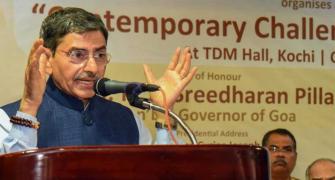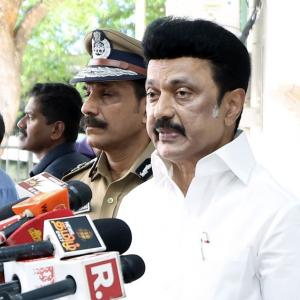'If it is repeated by other governors, then no government will be safe.'

Constitutional expert and former secretary general of the Lok Sabha P D T Achary discusses with Prasanna D Zore/Rediff.com the Constitutionality of the sacking of jailed Tamil Nadu minister V Senthil Balaji from the council of ministers by Governor R N Ravi on June 29.
The Enforcement Directorate had arrested Balaji on June 14 for his alleged involvement in a cash-for-jobs scam and a communication released by Ravi's office held that Balaji was influencing and obstructing the investigation against him and obstructing the due process of law.
Late on Thursday, June 29 night, Ravi's office informed Chief Minister M K Stalin that his decision to dismiss Balaji was on hold pending clarification from the Attorney General of India.
Is it Constitutional for a governor of a state to sack a minister without the chief minister's recommendation or advice>
No, it's not Constitutionally proper for the governor to do that (sack a minister without the chief minister's advice or recommendation).
The Constitution does not permit the governor to dismiss a minister at will. Governors can dismiss a minister only on the recommendation of the chief minister.
Who shall be a minister in a government or who shall not be a minister in a government will be decided only by the chief minister and that discretion cannot be transferred to the governor.
Still Tamil Nadu Governor R N Ravi has gone ahead and done it. Is it unconstitutional then on the governor's part and will it set a new precedent?
It is not in accordance with the Constitution.
By dismissing a minister, the governor is actually setting a very dangerous precedent.
If it is repeated by other governors, then no government will be safe.

So what's Senthil Balaji's legal status?
That is actually for the (apex) court to decide. Now that this problem has arisen, the governor has dismissed the minister.
Whether it is actually a dismissal, whether it's Constitutionally (valid or not), whether the minister is out of the cabinet or whether he's still in cabinet, is only for the (apex) court to decide.
Does our Constitution have any provision that allows a governor to sack a minister without the chief minister's recommendation? Should the court come into the picture?
Because it (the Constitutionality of sacking of a minister by a titular head of a state without the recommendation of the chief minister and the council of ministers that forms the political executive) involves the interpretation of the Constitution, the (Supreme) Court will come in.
If the (apex) court finds that the governor has acted outside the Constitution, then the court would say that this is not dismissal.
Till the time the court hears this case comes to a decision, what will be the status of the minister who has been sacked? Will he remain sacked or will he still be a minister?
If the court strikes down the order of the governor, then actually the minister will remain in the cabinet.
Till the time the court gives its judgment...
That I can't say. The governor has (already) dismissed the minister. If there is a dismissal (of a minister by a governor), then that order has to take effect.
The point is you and I cannot decide whether it is the wrong dismissal or not. It is for the (apex) court to decide.
Doesn't the Constitution clearly lays down the grounds for who can or cannot sack a minister and how?
The Constitution does not clearly lay down anything. The Constitution simply says the ministry shall be appointed (by the governor) on the advice of the (chief) minister, and the minister shall hold office during the pleasure of the governor.
If you go literally by these wordings, then that may mean that the governor has the power to dismiss a minister. But then that is not to be taken literally, because under our Constitutional set-up, the governor is not an executive governor; he's only a Constitutional head (just like the President of India is).
That vests the executive power in the council of ministers and all the decisions -- for example, appointing a minister, and who should be the minister, and who should not be a minister -- are taken as per the discretion of the chief minister.
If he doesn't want the minister to continue in his ministry, then he will advise the governor to remove him. The governor will act by withdrawing his pleasure.
Is there any precedent to this sacking?
There is no precedent. I don't remember any precedent.
Do you foresee a situation where the governors of non-BJP ruled states embarking on such an adventure? Would the TN governor's order embolden other governors to follow suit?
That is for other governors (to decide). I can't say anything about it.










